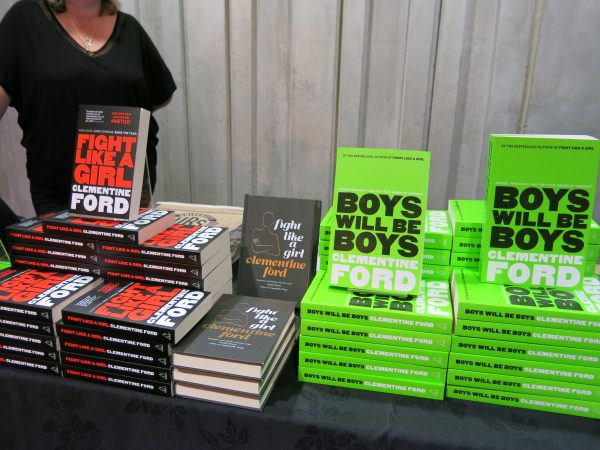The last time feminist writer and "woman with opinions" Clementine Ford spoke at a WORD Christchurch event in 2017 she was very much in a "scripted talk" mode. There was a powerpoint presentation filled with screenshots and imagery and there were jokes (and some really, really terrible language - words directed at her from angry men). Last night's event at St Margaret's College was a more relaxed affair in which she sat down with Stuff journalist Cécile Meier and discussed feminism and all the implications it has for people (regardless of their gender).
It was a wide-ranging discussion that touched down in lots of different related areas. And judging by the silent nods of agreement around me, much of what was discussed resonated with the audience, most of whom were women.
Ford's current book, Boys Will Be Boys, is about dismantling the toxic restrictions and expectations we place on boys, i.e. that they should be interested in sports and rough-housing, they should not talk about their feelings or have emotional connections with other men, they shouldn't wear pink because that's for girls.
My son is five and pink is his favourite colour and I just don't know why anyone would feel the need to tell him his favourite is wrong. Scenes from Monty Python films aside, I don't think it's possible to be wrong about your favourite colour. This is a small thing but it's emblematic of some of the concerns I have as his mother about how we manage these expectations and restrictions of manhood as he grows, so I'm keen to listen and learn more.
The one thing I was struck by at this event was how articulate and thoughtful Ford is in her responses. She takes time to think about what she wants to say before she says it and is careful and deliberate when she does speak (this is not an insight you necessarily get from a prepared talk).
The topics she talks about are highly emotive for many women - we feel fear when discussing acts of sexual violence and abuse, we feel anger too, great wells of it. Finding a way to express yourself coherently about things that are unfair or hurtful or just plain horrifying is no small thing. If there's one thing that Ford does really well it's articulating what many women feel and know about the world but aren't able to state as plainly and as forthrightly as she does. In this way she speaks for many of us.
She is angered by a lot of what she sees happening to other women but even in acknowledging that anger she's kind of relaxed about it? She admits that she has a little of the "Pollyanna" about her and is hopeful and optimistic that things actually will change.
It's difficult to summarise everything that was covered in the hour or so of discussion but you might get a sense of the ground covered via the selection of quotes I managed to scribble down.
On sexual consent
"Consent is an ongoing process - it's not like a rollercoaster and you're along for the ride until it's over..."
On Freedom of speech
"I think people confuse 'freedom of speech' with 'freedom from conversation'"
On women being allowed to express anger
"It's okay to be angry... We're human beings. We're entitled to the full range of emotions."
On being honest with yourself about your reactions to upsetting information
"Saying 'but you're making me feel bad and I'm a good person', isn't being a good person."
"The best thing I can feel is uncomfortable... It's my job to sit in my discomfort and make changes in myself."
On what men sometimes get wrong about feminism
"It's not about condemning men. It's about saving men."
On why not all jokes are worth making
"If the person most likely to laugh at your joke is a rapist... have a think about your humour."
On the prevalence of violence by men against women
"'99.99% of men would never harm a woman' - that statistic is bull****."
The audience questions were largely thought-provoking and useful ones, though not necessarily uplifting. Hearing an exasperated 18 year old ask "what are we teaching the younger generation?" because her 10 year old sister has been cat-called... is hard. But I think Ford's book is a great place to start in addressing this very thing.
A sole question by a man was taken at the very end of the Q and A portion, and I salute him for his bravery in asking for advice on how to get people more interested in... International Men's Day. Ford's answers, like all of those given last night, were generous and thoughtful. She congratulated him on making the effort. These things take time to build. Communicate the positives and benefits to men and to the community. Make sure it's understood that International Men's Day is not about pitting men and women against each other.
And then a man in the audience, who was obviously put out that he hadn't had a chance to speak (and who had done some heckling during Ford's previous answer), simply stood up and started talking... kind of loudly. And then another man started shouting at him, and then a third got involved.
And so most of the audience filed out of the auditorium, having listened for most of the evening to a kind and reasoned conversation between women, to the sounds of men shouting at each other...





Add a comment to: Clementine Ford: Angry but optimistic